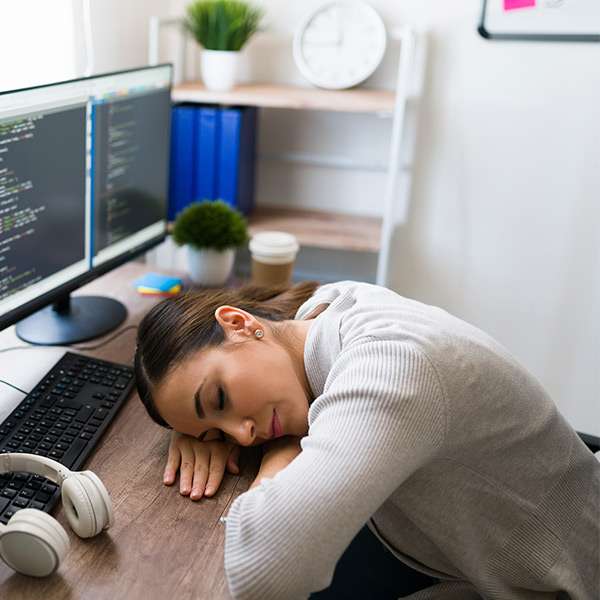Do you know how sleep deprivation can alter the sleep pattern of workers?
Sleep is one of the most important and essential aspects to our well-being. Think of the brain as a battery and sleep is the power source that charges the battery. If your battery isn’t fully charged you won’t function at full capacity.
What is sleep deprivation? Sleep deprivation is a sleep issue that affects a large percentage of the Canadian population with 59% of adults saying they don’t get enough sleep on a regular basis.
How to know if you are sleep-deprived?
 There are several ways your body will let you know that you haven’t had enough sleep. Some of the main symptoms of sleep deprivation are as follows:
There are several ways your body will let you know that you haven’t had enough sleep. Some of the main symptoms of sleep deprivation are as follows:
- Poor communication: Intensity of voice drops, long intervals/pauses for no reason, lacking enunciation, repeating words or sentences, losing place in sentence sequence.
- Distraction: Trouble focusing on one thing, can’t keep track of events.
- Bad mood: Quiet, socially withdrawn, outbursts of anger or sadness.
- Increased number of errors: Simple mistakes made, unable to notice mistakes and fix errors.
- Poor memory: Another sign of sleep deprivation is decreased short-term memory, decreased ability to develop strategies based on new information, inability to remember temporal sequence of events.
- Ageing appearance: Sallow skin, puffy eyes, fine lines, and dark circles under eyes.
- Hunger: Increase in appetite, stimulated craving for high-fat and high-carbohydrate foods.
- Headaches: Dull and continuous waves of pain usually in the forehead or top of head.
It is human nature to brush off warning signs and keep going, but you are putting yourself at great risk when ignoring your body’s communications.
You may also be interested in: 4 Health And Wellness Programs With A New Approach
What are the risks of sleep deprivation?
Cortisol is a hormone that the body releases when it experiences stress; sleep deprivation causes this as well. Cortisol has been known to break down the collagen in skin, which is the protein that maintains the smoothness and elasticity. Frequent sleep deprivation will make you look older and cause your skin to sag faster than it normally would.
Although this side effect may be the most important to some people, there are greater risks you should heed if you suffer from sleep disorders or chronic sleep loss.
Danger of heart disease, heart attack, heart failure, irregular heartbeat, high blood pressure, stroke, and diabetes are present for those who do not seek help. Insomnia doubles the risk of death from cardiovascular disease.
What are the effects of sleep deprivation?
Sleep deprived also causes lower libidos and less interest in sex. Over time insomnia will cause depression and anxiety as well. Those who suffer from depression often experience insomnia as it is considered one of the first symptoms of depression. It’s hard to break this frustrating cycle once you get trapped in it, but help is always available for those who seek it.
If a person has four or more nights or partial sleep deprivation, meaning less than seven hours of sleep each night, it is equivalent to a total night of sleep deprivation. Having one single night of total sleep deprivation can affect your functioning for up to two weeks.
Not only can sleep disorders affect your health and personal life, but it can also creep into your professional life as well and start having negative effects on your career.
Read also: 3 Good Strategies For Managing Mental Illness In He Workplace
How does sleep deprivation affect my workplace performance?
 Cognitive capacity can be reduced by up to 50% due to sleep deprivation and employees with sleep issues can cost an employer up to $5,000 a year in lost productivity. There are too many employees who suffer from lack of sleep or poor quality of sleep, and this could be holding them back professionally.
Cognitive capacity can be reduced by up to 50% due to sleep deprivation and employees with sleep issues can cost an employer up to $5,000 a year in lost productivity. There are too many employees who suffer from lack of sleep or poor quality of sleep, and this could be holding them back professionally.
The awareness of sleep deprivation is growing, and some companies have started initiatives to better the quality of sleep for their employees. Goldman Sachs have brought sleep experts in to talk with staff and Google hosts ‘sleeposium’ events. Johnson & Johnson offers their employees a digital health coaching program to battle insomnia.
This consists of keeping an online sleep diary and relaxation videos that people can access on their mobile devices.
A research study conducted at Harvard uncovered the following results:
- Insomnia can lead to the loss of 11.3 days’ worth of productivity each year (loss of $2,280 on average).
- 170 days for a small business with 15 employees or less (loss of $34,300 on average).
- Estimated loss in productivity on a national level is $63.2 billion.
Poor sleeping habits could be the reason why people “zombie” their way through the work week and lose out on promotions and opportunities to better their career because they lack the motivation and energy to try.
Learn more about: How To Optimize Mental Health In The Workplace For Employees?
How can I get better sleep?
Environment is an extremely important part of a good night’s sleep. For those who aren’t lucky enough to be able to fall asleep anywhere, like that stranger on the bus who falls asleep on your shoulder, the sleep environment plays a significant role in the quality of sleep you can achieve.
To set yourself up for a successful night of restful and rejuvenating sleep pay attention to these key factors:
1. Mattress
Finding the perfect mattress can be a challenge, especially for those who suffer from sleep issues. Firmness, material, and size play a big part in the right mattress for your body. If you find yourself tossing and turning all night, trying to get comfortable, it may be time to invest in a new mattress.
A comfy pillow with ample head and neck support is important as well. Couples especially need to make sure they find a mattress that has a desirable level of motion isolation. Remember that old mattress commercial with the bowling ball and the pins that don’t fall over?
That’s exactly the type of mattress couples need if either one suffers from sleep problems to not disturb their partner when moving about or getting in and out of bed.
2. Light
Or lack thereof. A sleep environment should be as dark as possible because light inhibits the secretion of melatonin. Melatonin is the hormone produced by the brain that prevents sleep deprivation. Using blackout curtains on windows, turning off the TV and other electronic devices which produce light, or sound are recommended at least one to two hours before bedtime.
3. Temperature
To fall asleep, the body must be comfortable and relaxed in all aspects. Temperature plays a key role and studies show the ideal temperature to fall asleep is 65°F / 18°C.
Finding the perfect combination of coolness in the air and the warmth of blankets and bedding will encourage the body to fall asleep and wake up feeling refreshed.
How to counteract the causes of sleep deprivation?
Besides these nighttime suggestions there are several things you should try during the day to help promote a good night’s sleep. Spending time outside being exposed to natural sunlight helps to regulate melatonin. Giving yourself at least half an hour every morning to let your mind and body adjust to being awake is very beneficial.
Use this time to do leisurely activities that you enjoy such as reading a book, going on a walk, or making yourself breakfast. Restricting the intake of caffeinated beverages after 2 p.m. and monitoring alcohol consumption are important things you should keep track of as it can cause restlessness at bedtime.
It’s easy to moan and groan about sleep deprivation, but the responsibility will always land on you alone to maintain a decent sleep cycle. It’s an around-the-clock task that you should always keep yourself aware of and make decisions based on.
Ask for help
If you’ve tried the tips above and are still suffering from sleep deprivation – it is time to get help. The sooner you seek professional aid the better it will be for your health currently and in the long run.
Doing a sleep study is highly recommended as doctors will monitor your body and brain function to arrive at a diagnosis. Sleep studies are the main way for people to find out whether they suffer from sleep apnea, which is when you stop breathing, or have shallow breathing, that can last anywhere from a few seconds to minutes.
The brain and body will not get enough oxygen which could cause permanent damage or even death. People who suffer from sleep apnea often use a CPAP machine, which helps force air through a mask to initiate breathing.
Sleep studies are covered by the government in certain provinces, usually only one per lifetime and is something that you should consider if you’re a victim of sleep deprivation. Don’t underestimate the power of sleep and how vital it is to your physical and mental health. Sleep well and don’t let the bedbugs bite!
Take advantage of the benefits offered by your employer
In recent years we have seen a notable increase in interest in the mental health of workers. As a result, it is becoming increasingly common for employee health and wellness programs to include mental health strategies.
Check if your EAP or Health Insurance has benefits related to improving sleep patterns. If this is the case, take them and thus contribute to significantly improve your quality of life and work performance.

